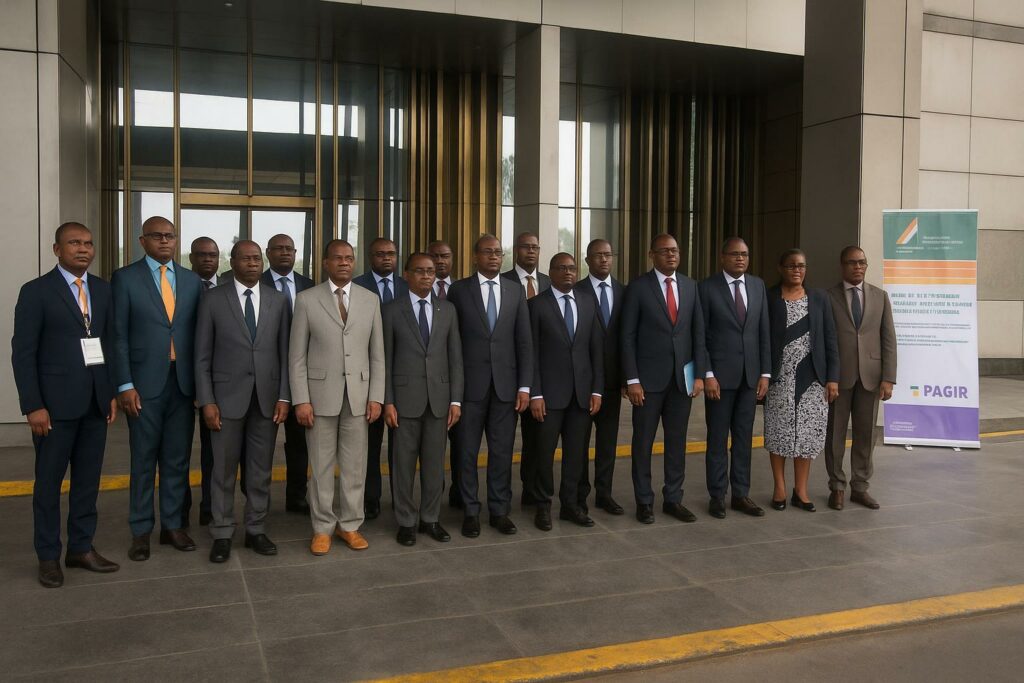A strategic pivot toward international best practice
The echoing hall of the ministry on Avenue de la Paix felt momentarily like a lecture theatre as Minister of Finance, Budget and Public Portfolio Christian Yoka opened the technical workshop devoted to validating a new corpus of public-sector accounting standards. His declaration that “we can no longer manage twenty-first-century challenges with twentieth-century tools” captured the political intent behind the initiative. The reform, developed under the Accelerated Programme for Institutional Governance and Reforms (PAGIR) and technically shepherded by the World Bank, positions Congo-Brazzaville to adopt norms broadly inspired by the International Public Sector Accounting Standards, IPSAS (World Bank 2023). The subtext is unambiguous: better numbers yield better policy, and better policy consolidates the social contract.
From budgetary discipline to macroeconomic credibility
Officials close to the dossier point out that the Congolese treasury still grapples with systemic revenue leakages estimated at several percentage points of GDP (IMF Article IV 2022). By requiring a fair valuation of public assets and liabilities, the forthcoming reference framework is expected to reduce the mismatch between booked and real resources, closing space for opacity. Minister Yoka underscored that aligning domestic rules with global templates is also a diplomatic move, demonstrating to multilateral lenders and private investors that Brazzaville accepts the same yardstick as comparable emerging markets. In an era of cautious capital flows, such signalling is regarded as an inexpensive yet potent instrument for lowering sovereign risk premia.
The Supreme Audit Court steps into the limelight
Central to the architecture is the enhanced role of the Cour des comptes et de discipline budgétaire, which will henceforth certify the State’s general account, including a full set of financial statements—balance sheet, statement of financial performance, cash-flow table and detailed notes. This upgrade mirrors the mandate of many European supreme audit institutions and, according to magistrates present at the workshop, will oblige line ministries to reconcile their own ledgers monthly rather than annually. The measure, though technical, is politically resonant: it elevates evidence over conjecture in parliamentary oversight and curbs discretionary spending outside the voted budget.
‘À retenir’ : corruption deterrence through clarity
Participants repeatedly linked the accounting reform to the national struggle against corruption. The notion is straightforward. When asset wp-signup.phps become transparent and transaction trails harder to obscure, the opportunity cost of malfeasance rises. In a country where the Head of State has placed probity at the core of his economic modernisation agenda, the symbolism of embedding anti-graft safeguards within ledger codes is substantial. Civil-society representatives who attended as observers said the reform would make it easier for them to request and interpret fiscal data, an incremental gain for public scrutiny.
Legal and economic deep dive
Le point juridique/éco souligne que les nouveaux textes s’appuient sur l’article 38 de la Constitution consacrant la reddition des comptes et sur la directive CEMAC relative à la discipline budgétaire. Sur le plan économique, la transition vers une comptabilité d’exercice devrait améliorer les statistiques de la dette publique, facteur déterminant dans la capacité de Brazzaville à négocier des facilités élargies de crédit. Analysts note that clearer fiscal anchors will better inform the medium-term expenditure framework currently under preparation.
Capacity building: the next frontier
While the legal scaffolding is nearing completion, the minister candidly acknowledged the human-resource challenge. Less than a third of public accountants are presently certified in accrual-based techniques. The World Bank is therefore financing a tailored training programme for 500 officers over eighteen months, supplemented by digital tools designed to automate report consolidation. Senior officials nonetheless caution that changing mindsets—adopting what Yoka called “a culture of accountability”—may take longer than deploying software.
Citizens’ dividends and regional positioning
Beyond balance sheets, the ultimate beneficiaries should be Congolese citizens facing increasing demands for resilient public services. Transparent accounts are expected to redirect resources toward social infrastructure and mitigate the fiscal impact of commodity-price volatility. Regionally, Brazzaville’s adoption of advanced standards could set a precedent within CEMAC, fostering convergence that facilitates cross-border investment and collective debt management. As one World Bank expert remarked during a coffee break, “good numbers are contagious.”
A cautiously confident horizon
The workshop ends on 20 September, but its stakes extend well beyond the closing communiqué. If the reference framework is effectively implemented, Congo-Brazzaville will join the small circle of African economies that publish auditable, IPSAS-compliant statements. That prospect carries reputational dividends that no communiqué can fully capture. For now, the tone in Brazzaville is confident yet measured, echoing the minister’s own words: building credible public accounts is not an event but a process—one that begins with pen and paper yet culminates in greater trust between the State and its citizens.

